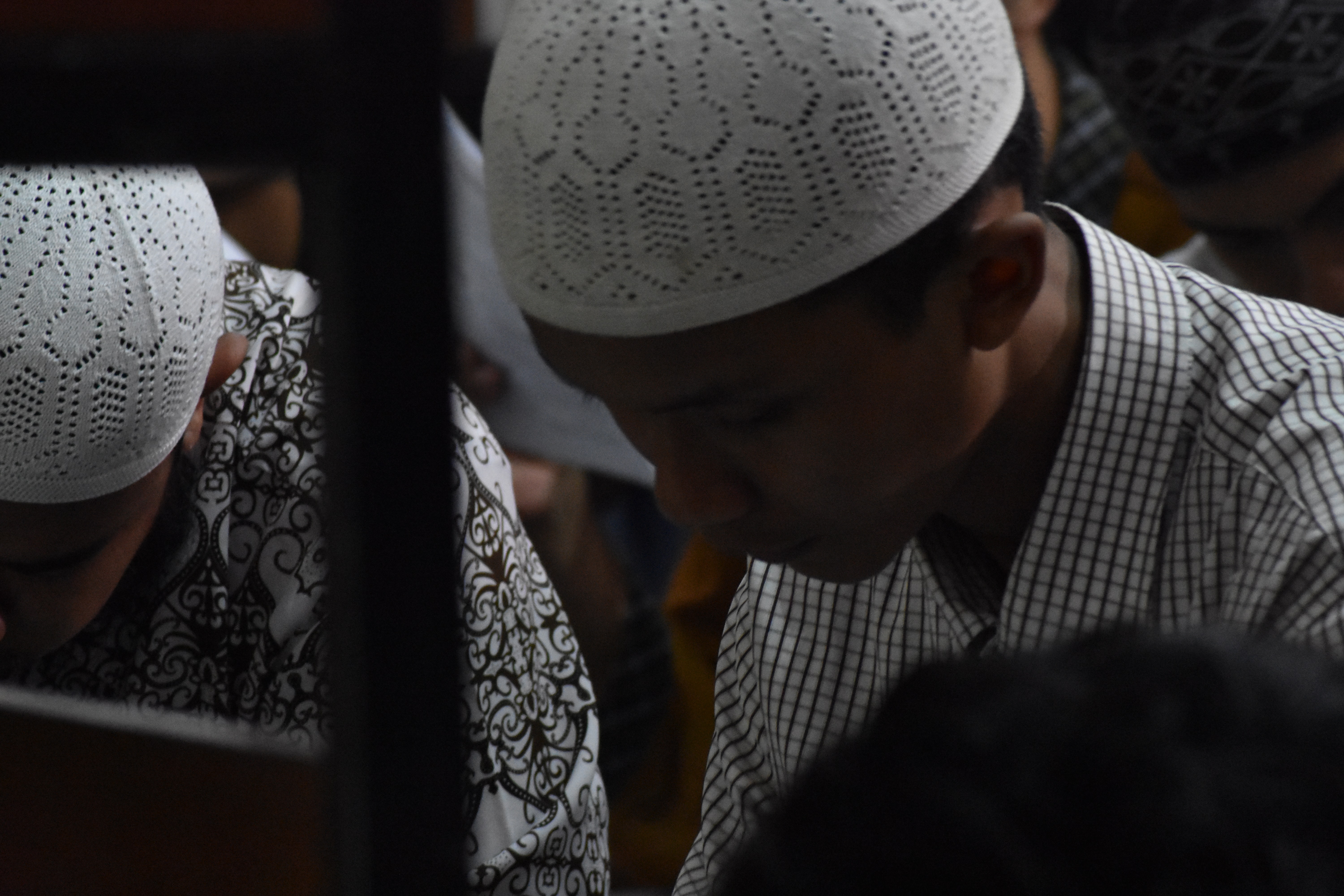Guantanamo Six: Justice or Show Trials?
Courtesy William Fisher
Zaynab Nawaz ,30, from Virginia with Amnesty International, marched in support of closing the Guantanamo Bay detention center in Cuba, during a rally in Washington, D.C., Jan. 11. The group marched from the National Mall to the Supreme Court building.
As the United States moves toward the death sentence trials of six suspected terrorists at Guantanamo Bay, Cuba, legal scholars and human rights advocates are raising questions, not only about the process that led to the prosecutions, but also about the Bush administration’s motives in bringing the charges now and the credibility of the trials themselves.
The charges filed against the six, including alleged Sept. 11, 2001 mastermind Khalid Sheik Muhammad, outline a litany of war crimes that include conspiracy, murder, attacking civilians, terrorism and supporting terrorism. All six suspects are being held at Guantanamo Bay, and the military plans to try the six together. If convicted, they would likely be executed at Guantanamo.
Before being shipped to Guantanamo, five of the defendants were held without charges or legal representation by the U.S. Central Intelligence Agency in secret prisons in Eastern Europe and elsewhere and reportedly subjected to torture.
The administration of George W. Bush has acknowledged that at least one of the defendants, Muhammad, the reported “mastermind†of the 9/11 attack on the World Trade Center and Pentagon, was subjected to “water boarding†while in custody.
Water boarding, a technique that simulates drowning, has been acknowledged as torture for hundreds of years. During World War Two, U.S. authorities prosecuted Japanese soldiers for using the practice against American prisoners of war. Newly appointed U.S. Attorney General Michael Mukasey, has declined to say whether water boarding is torture.
Vice President Dick Cheney has vigorously defended the use of water boarding and other harsh interrogation techniques, referring to them as “a tougher program for a very few tougher customers.â€
Of the six charged, Muhammad and four others were held for as long as three years in secret CIA prisons that were part of what the agency calls its “high-value terrorist interrogation program.†The prisons were established in 2002, but the administration did not publicly reveal their existence until 2006.
Military authorities have declared that no evidence obtained through torture will be used at the trials.
But many legal experts, including Columbia law professor Scott Horton, are questioning whether the government can convict the six without using evidence obtained through torture.
Horton said he believes the process used to establish the Military Commissions – criminal courts run by the U.S. armed forces – is likely to result in what says will be “a series of show trials†timed to strengthen the Republican Party’s chances in the 2008 presidential election.
Horton is one of a large group of lawyers and legal scholars who are questioning the government’s motives and well as its timing in deciding to move ahead with the trials.
He added, “After being held for six years, there is a suspicion that the timing of trials is being ‘politically manipulated’ to coincide with the 2008 presidential election. He said he feared the result will be a case “bordering on a show trial.â€
This viewed is shared by Michael Ratner, president of the Center for Constitutional Rights, a New York-based legal advocacy group, which represents one of the defendants, Muhammad al-Qahtani, who has been held at Guantanamo for six years and claims to have been tortured during that time.
Ratner said that the Military Commission system “has none of the guarantees of regular trials. Coerced and hearsay evidence can be used. There is no jury, only a group of military officers, and the judge is appointed by the Bush administration. Much of the trial can be held in secret and the defendant does not get to see all of the evidence. After this sham process the defendant if convicted can receive the death penalty. There is a barbarity to the actions of the Bush administration that is without precedent.â€
Many military lawyers have expressed similar views. For example, the head prosecutor at Guantanamo, Col. Morris Davis, resigned when he was placed directly under the command of the General Counsel of the DOD, a principal author of the military commissions system.
And lifelong Republican John Hutson, a retired judge advocate general, has expressed increasing frustration with the Bush administration’s treatment of detainees at Guantanamo Bay. Hutson has become a leading voice among former military officials opposing Bush policies on Guantanamo Bay and torture, worried about the precedent it would set for future conflicts.
But the Bush administration argues that ordinary courts are not equipped to handle the sensitive national security considerations involved in trying top terrorists.
A spokesman for the Pentagon, Air Force Brig. Gen. Thomas W. Hartmann, a Defense Department legal adviser, said the trials will be “as open as possible,†and the accused will have the right to call their own witnesses, cross-examine prosecution witnesses and see the evidence presented against them.
“There will be no secret trials,†he said. He added that the defendants will be tried by a 12-member military commission, which must reach a unanimous verdict. A decision to impose a capital sentence also must be unanimous, he said.
But Hartmann declined to answer questions about the admissibility of evidence obtained by water boarding, which the CIA has acknowledged using to extract information from one of those now being charged.
The procedures of the military commissions have been repeatedly challenged in US civilian courts, resulting in stinging defeats for the Bush administration and contributing to the delays in beginning prosecutions.
The legal saga began in 2001, when Bush issued an executive order establishing military commissions to try those captured in the “War on Terror.†But in 2004, a federal judge ruled that Salim Hamdan–accused of being a driver of Osama bin Laden–could not be tried by a commission established by an executive order. Only an act of Congress, the court suggested, could be legal.
So in December 2005, a Republican-controlled congress passed the Detainee Treatment Act of 2005 (DTA). It stripped US courts of jurisdiction over habeas corpus petitions filed on behalf of Guantanamo detainees challenging the reason for their detention and vested exclusive review of final decisions of military commissions in a single circuit court.
A year later, an appeals court overturned the Hamdan decision. And a year after that, the Supreme Court reversed the appeals court decision. The High Court ruled that military commissions, as defined under the president’s executive order, violated military law and the Geneva Conventions.
Congress then hurriedly enacted the Military Commissions Act of 2005, which Bush signed into law in early 2006. That law, which is still under challenge in the courts, became the basis of the current prosecutions.
The forthcoming trials have also generated considerable interest abroad. For example, the influential British newspaper, The Independent, wrote last month: “The decision to use Muhammad and the others as guinea pigs in a constitutionally dubious legal proceeding is likely to trigger a firestorm of anti-American sentiment in the Islamic world and spark a fractious domestic debate in an already highly charged presidential election year.â€
Concern about the credibility of the US has also been voiced by many American legal scholars.
David Cole, one of America’s preeminent constitutional authorities was quoted as saying, “For better or worse, the U.S. is a world leader on matters of human rights. When the U.S. violates human rights in the fight against terrorism, it sends a message to autocrats and dictators worldwide that they, too, can deny human rights in the name of counterterrorism.â€
10-9













2008
781 views
views
0
comments